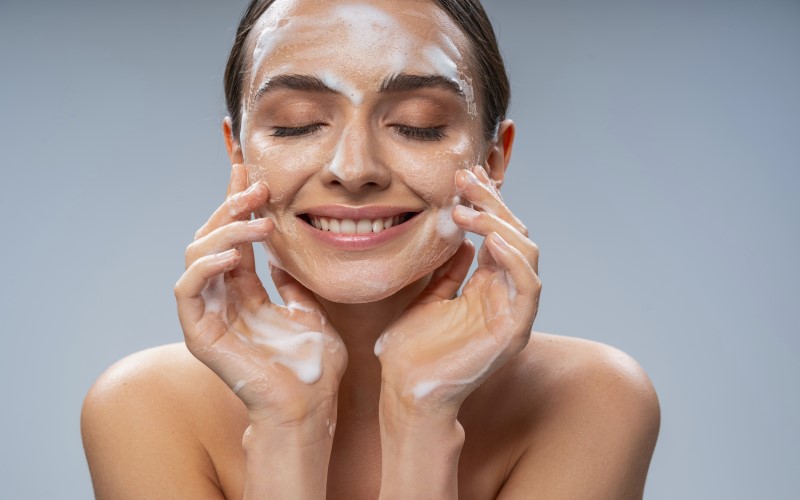Navigating Oil Cleansers and Face Wash for Acne-Prone Skin
Feb 11, 2024 By Nancy Miller
When it comes to managing acne-prone skin, finding the right skincare routine is essential. Two popular choices in the market are oil cleansers and face wash. Let's break down their effectiveness and how they cater to the unique needs of acne-prone skin.
Understanding Oil Cleansers:
Oil cleansers have gained popularity for dissolving makeup and removing excess oil without stripping the skin. Oil cleansers, often formulated with nourishing oils, are gentle on the skin's natural barrier. This helps prevent excessive dryness, a common concern for those with acne-prone skin.
Pros of Oil Cleansers:
Here are some noteworthy pros of using oil cleansers for acne-prone skin:
Gentle Hydration:
Oil cleansers stand out for their ability to provide hydration to the skin without clogging pores. Unlike some face washes that can be harsh and strip the skin of its natural moisture, oil cleansers work to maintain a healthy balance. This gentle hydration is particularly beneficial for individuals with acne-prone skin, as it helps prevent excessive dryness that could potentially exacerbate skin issues.
Effective Makeup Removal:
One of the notable advantages of oil cleansers is their proficiency in breaking down stubborn makeup. The oil-based formula effectively dissolves makeup products, ensuring a thorough and complete cleanse. This quality makes oil cleansers a preferred choice for those who wear makeup regularly, as it contributes to a more comprehensive cleaning routine that removes impurities and lingering cosmetic products.
Preservation of Skin Barrier:
The nourishing properties found in oils used in these cleansers play a crucial role in preserving the skin's protective barrier. This protective barrier is essential for maintaining the skin's overall health and resilience. By using oil cleansers, individuals can enjoy the dual benefits of effective cleansing and reinforcing the skin's natural defence mechanisms, contributing to a more resilient and balanced complexion.
Cons of Oil Cleansers:
Now come the cons that you might experience when using oil cleansers!
Potential Residue:
Despite their benefits, some users may encounter a potential downside with oil cleansers – a slight residue left on the skin. This residue can concern those who prefer a clean, residue-free feel. To address this, it becomes crucial for individuals using oil cleansers to follow up with a water-based cleanser. This two-step cleansing process ensures the complete removal of any residue, leaving the skin refreshed and free from any lingering product.
Individual Sensitivity:
While oil cleansers are generally well-tolerated, individuals with specific oil sensitivities may need caution in their choice of products. Certain oils or formulations may not be suitable for everyone, and those with known sensitivities should carefully select oil cleansers tailored to their skin's needs. By doing so, they can avoid potential adverse reactions and enjoy the benefits of oil cleansing without any negative impact on their skin health.

Exploring Face Wash for Acne-Prone Skin:
Face washes, on the other hand, come in various formulations, including gel, foam, and cream. They are designed to remove impurities and excess oil from the skin's surface, making them a staple in many skincare routines.
Pros of Face Wash:
Let's move on to the benefits of using face wash for acne-prone skin!
Deep Cleansing:
Face washes effectively provide a deep cleanse by removing surface oil and impurities. This makes them particularly suitable for individuals with acne-prone skin, as they help prevent excess oil buildup and reduce the risk of clogged pores. The deep cleansing action of face washes contributes to maintaining a clear and refreshed complexion, making them an essential part of a skincare routine focused on managing acne.
Variety of Formulations:
A significant advantage of face washes lies in the diverse range of formulations available. Whether it's a gel, foam, or cream, individuals can choose a formulation that best suits their skin type and preferences. This variety allows for a personalized skincare experience, ensuring that individuals can find a face wash that addresses their specific needs and contributes to a comfortable and enjoyable cleansing routine.
Quick and Convenient:
Face washes are known for their quick and convenient application, making them ideal for individuals with a busy lifestyle. The ease of use and minimal time requirement make face washes a practical choice for those who need a straightforward and efficient skincare routine. This quick application does not compromise effectiveness, allowing individuals to maintain a consistent cleansing routine even when pressed for time.
Cons of Face Wash:
Besides pros, face wash has potential cons if used on acne-prone skin. These include:
Potential Dryness:
A notable drawback of some face washes is their potential to cause dryness, especially if they contain harsh ingredients. This can concern individuals with acne-prone skin, as excessive dryness may lead to irritation and worsen existing skin issues. It becomes crucial for users to choose a face wash with a balanced formula that effectively cleanses the skin without stripping away essential moisture, ensuring a gentle and nourishing cleansing experience.
Makeup Removal Limitations:
While face washes are effective for daily cleansing, they may have limitations when completely removing heavy makeup. Unlike oil cleansers, which excel at breaking down stubborn makeup, face washes may leave traces of makeup on the skin. Individuals who regularly wear heavy makeup should consider incorporating additional steps, such as a makeup remover, into their skincare routine to ensure thorough cleansing and prevent residual makeup buildup.

Finding the Right Balance:
The choice between oil cleansers and face wash depends on personal preferences, skin type, and the desired outcome. Incorporating both into a double-cleansing routine can benefit those who wear heavy makeup regularly.
Conclusion:
In the realm of skincare, there's no one-size-fits-all solution. The effectiveness of oil cleansers versus face wash for acne-prone skin ultimately boils down to individual preferences and skin reactions. By understanding the pros and cons of each, you can create a balanced routine that caters to your skin's specific needs. Remember, consistency is key to achieving and maintaining healthy, clear skin.








